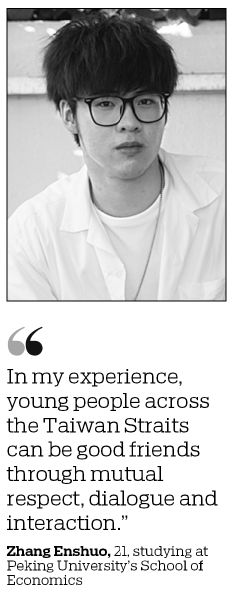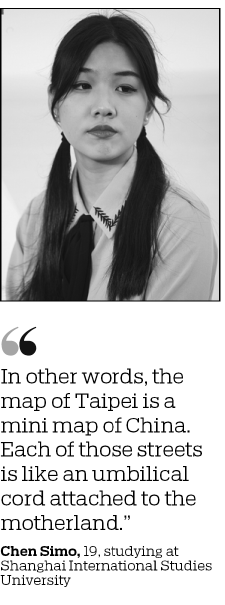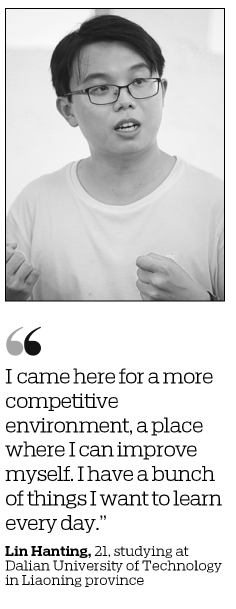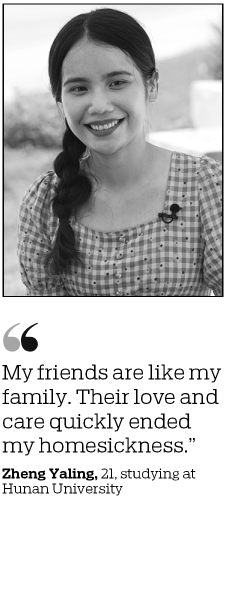TAIWAN STUDENTS EMBRACE LIFE ON THE MAINLAND
Young people quick to form cross-Straits bonds through their studies

Editor's note: Four students from Taiwan who study at universities on the Chinese mainland share their thoughts with Gen Z's Words and Youth Power, two online programs at 21st Century, a media organization affiliated with China Daily.
When Zheng Yaling, 21, received her admission letter from Hunan University two years ago, she immediately started looking up Hunan province on the internet. Born and raised in Jiayi, Taiwan, Zheng knew little about the Chinese mainland.
She quickly found that Yuelu Academy, located on the university's campus, was founded in 976 AD and was one of China's four major academies.
Hunan is also home to Zhangjiajie National Forest Park, where the movie Avatar was filmed, while Hunan TV, China's leading entertainment content producer and broadcaster, is based in Changsha, the provincial capital.
Everything she discovered about Hunan excited Zheng about her upcoming college life. But when she shared this news with her high school friends, she received a discouraging and disappointing acknowledgment. Her friends had many concerns about Zheng leaving Taiwan for a mainland province that neither she nor any of them knew anything about. Zheng would regret her decision, they said.
But to everyone's surprise, Zheng quickly adapted to her new life.
In her dormitory, she and her roommates looked after and motivated one another. For example, her roommates taught her to type in pinyin, to write simplified Chinese characters, and to understand various Chinese accents. When Zheng returned to the university after the summer and winter vacations, she got to taste local delicacies from nearly every mainland province, which her classmates brought from their hometowns.
On Lunar New Year's Eve, Zheng's friends asked her to join them for a dinner, and on her birthday, they locked her inside a bathroom, before surprising her with presents.
"My friends are like my family," Zheng said in the latest episode of Youth Power, which aired on Aug 30. "Their love and care quickly ended my homesickness. Whenever I need them, they are always there for me."
Zheng has also taken part in English speech contests, and in Model United Nations, an extra-curricular activity in which students typically act as delegates to the UN.She won the outstanding delegation prize for the Asia International Model United Nations.
Having a passion for music, Zheng found her ideal singing partner, who comes from Inner Mongolia autonomous region. With his powerful voice and her clear tones, they won the top 10 singers' award at Hunan University.
Zheng also has a vast world to explore off campus. For example, during the summer vacation this year, she visited several mainland destinations.
In Beijing, she marveled at the Forbidden City and the National Stadium, also known as the Bird's Nest, while in Yunnan province, she witnessed the rich and unique culture of ethnic groups. In the desert area of Ningxia Hui autonomous region, she saw how rural residents have been lifted out of poverty, and in Fujian province, she experienced the local culture, which closely matches that in Taiwan.
Looking back on the past two years, Zheng does not regret her decision to study on the mainland, and she aims to act as a "bridge" for communications and cooperation across the Taiwan Straits.
"I believe that culture can transcend time, space and region, and that we all have to work together to push forward cross-Straits cultural exchanges," she said.
She has another reason to be a cross-Straits "ambassador"-her mother is from Fujian, and her father is from Jiayi, her hometown in Taiwan.
LIN HANTING
A love of new challenges prompted Lin Hanting's decision to study at Dalian University of Technology in Liaoning province after he graduated from high school in Taiwan.
"I wanted to go somewhere far from home, just to take a risk," Lin, 21, told Gen Z's Words.
But he didn't want it to be too big a risk, such as going to a college overseas. Lin had communicated with people from Western countries, and the experience felt "foreign" to him. "You can tell the difference between yourself and them. The two thinking patterns are totally different," he said.
The mainland became an obvious choice for Lin, as it was sufficiently far from home, but still close enough to his origins and culture.
"The number of classmates excelling at their studies here in Dalian is far higher than in Taiwan," Lin said.
But this kind of pressure doesn't seem to be a problem for him. Instead, it's more of an opportunity.
"I came here for a more competitive environment, a place where I can improve myself. I have a bunch of things I want to learn every day," he said.
Lin also said that education in Taiwan focuses more on the pursuit of a stable life. Eager to embrace changes and challenges, he prefers life on the mainland where, he said, efforts are rewarded.
During the past year, Lin has seen many Taiwan students at his university and neighboring schools who are enjoying living and studying in Dalian.
Asked to choose three words to best describe the mainland, Lin opted for "competition", "solidarity" and "splendid". He said young people on the mainland are constantly competing with one another and striving for better grades, bigger prizes, and a brighter future. But when they face difficulties, they unite and achieve much together.
Lin witnessed such unity among young people on the mainland when United States House Speaker Nancy Pelosi visited Taiwan last month. He also voiced disappointment with the indifferent attitude held by some people in Taiwan toward this visit.
"Young people in Taiwan today care less about politics and more about profits. We need to stand together and be aware that Taiwan is a part of China, and this will never change," he said.
Lin has also witnessed a new trend on Sina Weibo, where netizens discuss the fact that many streets in Taiwan are named after mainland cities. "I think this can be regarded as a kind of nostalgia for our motherland, for our roots," he said.
He hopes that citizens from the mainland and Taiwan can work together to make China a better place.
However, a more immediate but much smaller goal for him is to take his friends in Taiwan to the Palace Museum in Beijing.
CHEN SIMO
A powerful speech was delivered by Chen Simo, 19, in the latest episode of Youth Power.
"We are keenly aware of how closely linked we are. We're both sons and daughters of China and descendants of the Yellow Emperor, and we know that a few drops of water can never separate us," she said, referring to the Taiwan Straits.
Chen, who was born in Taiwan and grew up in Wuhan, capital of Hubei province, regards both places as her home.
Many of her family members in Taiwan have also found opportunities on the mainland. For example, her uncle went to Shanghai 12 years ago to work in the semiconductor industry, since when Chen has proudly told people that many of the chips for smartphones and home appliances are produced at the factory where her uncle worked.
Chen also tries to look for cross-Straits links in her daily life. In Fujian, during a visit to Xiamen and Fuzhou, the provincial capital, she noticed numerous banyan trees. "In Taiwan, there are also many banyans-I guess that the tree symbolizes the connections between the mainland and Taiwan," she said.
She also visited the Palace Museum, both in Beijing and Taipei. She thinks the Palace Museum in Beijing is best-known for its architecture, while that in Taipei is famed for its delicate antiques.
As many streets in Taiwan bear the names of mainland cities, Chen made a fun discovery from a map of Taipei. Taking Zhongshan Road as the vertical axis and Zhongxiao Road as the horizontal one, and also drawing a coordinating cross, she found that Chengdu Road, Guiyang Road and Liuzhou Street are located in the southwest of Taipei. These cities are located in Southwest China.
Chen also found that Jilin Road, Liaoning Road and Changchun Road are located in the northeast of Taipei, and they are named after cities in Northeast China.
"In other words, the map of Taipei is a mini map of China. Each of those streets is like an umbilical cord attached to the motherland," she said.
Such a link was evidenced when COVID-19 broke out in Wuhan. Chen said that when food supplies ran short during quarantine, members of the All-China Federation of Taiwan Compatriots went to her home with rice, noodles and cooking oil.
Chen wants to take her friends in Taiwan to Yellow Crane Tower in Wuhan because the Tang Dynasty poet Li Bai once took his friend Meng Haoran, a fellow poet, there and they both created many beautiful verses. She hopes that by taking her friends to the tower, they will form a new understanding of friendship and connections, which also symbolize the bonds between the mainland and Taiwan.
Following her speech in the Youth Power episode, Chen, who is studying at Shanghai International Studies University, read a poem with her new friend, Wang Licheng.
Written by the late Taiwan poet Yu Guangzhong 50 years ago to express his yearning for the motherland, the poem includes these lines:
Nostalgia becomes a shallow strait;
me on this side, the mainland on the other
Some 50 years later, Chen and Wang, two teenagers from different sides of the Taiwan Straits, read the poem in Quanzhou, Fujian, the area of the mainland nearest to Taiwan.
ZHANG ENSHUO
Studying at Peking University's School of Economics, Zhang Enshuo, 21, who comes from Taiwan, said, "I think a lot of misunderstanding stems from a lack of connection, insufficient conversation, or a lack of interaction."
Zhang drew this conclusion because he grew up in Taiwan, and now studies on the mainland. Having lived on both sides of the Taiwan Straits, he is one of many who can see that the gap between the "two sides" would never have existed if there had been sufficient communication.
He remembers a picture from his middle school textbook of residents from Quanzhou, Xiamen and Guangdong-coastal cities and province on the mainland-moving to Taiwan. But such content was soon removed from textbooks, and children younger than Zhang barely had a chance to learn the history of the cross-Straits relationship.
However, Zhang's high school provided students with regular trips from Taipei to Beijing and Shandong province. Zhang visited both destinations, getting to taste the delicious local cuisine, and taking in the beautiful scenery in northern China, which is very different from that in Taiwan. He was also impressed by the warm greetings he received from locals.
Even though these trips were short, they opened up a new world for Zhang. After he returned to Taiwan from the journeys, he developed an interest in the mainland, and looked for books to read about it. He also talked to local elderly people about their time on the mainland before they moved to Taiwan.
"I think that face-to-face conversation and interaction is very important," Zhang said in the latest episode of Youth Power.
These trips were also one of the reasons Zhang decided to study at Peking University, as he longed for a bigger stage.
One of China's leading universities and a world-class institution, Zhang soon found that his place of study is a talent hub and home to the nation's smartest and most hardworking students.
"My fellow students are all super excellent, so the competitive environment is quite different from that in Taiwan," he said.
Such competition is driving Zhang to work harder and learn more.
"We cannot stop learning, because the world is changing too fast-way too fast-and if we stop learning we will be surpassed by others," he said.
Zhang is a member of a Peking University startup company. He is also designing a social media app for college students to discuss whatever they want, whenever they want. By joining this project, he feels he is engaging in what he believes in the most-people-to-people communication.
He regularly updates his social media account with photos and videos for his friends in Taiwan to learn about his life at Peking University. "Many of my friends are curious about how I am getting on in Beijing," Zhang said.
"In my experience, young people across the Taiwan Straits can be good friends through mutual respect, dialogue and interaction. My wish is that with better understanding, we can build stronger bonds across the Straits."






Today's Top News
- Xi congratulates Yoweri Museveni on re-election as president of Uganda
- Systematic approach sees return of clear waters to the Yangtze River
- IP protection for new fields to improve
- Draft rules define premade dishes in consumer interest
- Xi greets To Lam on election as Vietnam party leader
- China, Brazil vow to further deepen ties






























